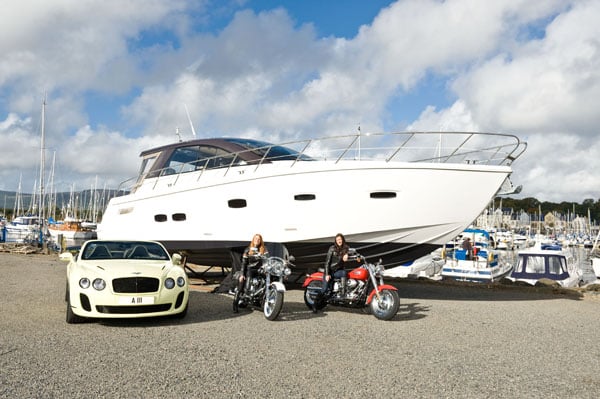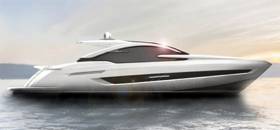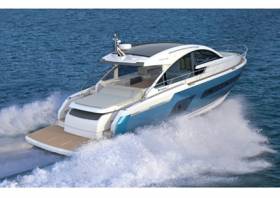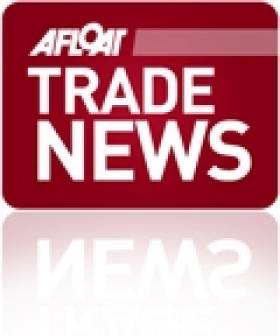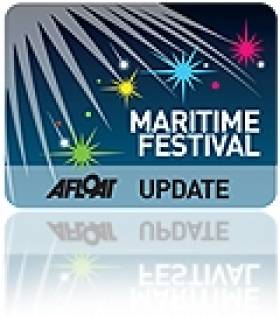Displaying items by tag: Fairline
Fairline Unveils First Mancini design
British boatbuilder, Fairline Yachts, has unveiled its first yacht designed by renowned Italian superyacht designer, Alberto Mancini.Targa 62
The new Targa 62 GTO is the first of the new generation of models from Fairline Yachts featuring the world class combination of Mancini’s Italian styling naval architecture by renowned Dutch firm Vripack and the hand-crafted, made in Great Britain quality of Fairline’s builders. The boat is currently in the final modelling stages with production set to begin this autumn and customer deliveries expected in the summer of 2017.
Mancini’s influence is clearly evident in the Targa 62 GTO, resulting in a sleeker style for Fairline. Andrew Pope, Head of Design at Fairline Yachts, explains, “The benefit of working with external designers is they push the boundaries of what is considered possible. Alberto has brought a fresh approach in his interpretation of Fairline’s design language. With the Targa 62 GTO, we have an exciting new shape which clearly retains Fairline’s design DNA. It is a progression – an evolution not a revolution – and an exciting first step in Fairline’s future design journey. Similarly, our naval architects, Vripack – who have a huge amount of experience working across boats of all types – have designed a hull shape that allows for maximum volume, which in turn has significantly improved comfort levels on board, as well as making the boat stable, dry and very safe.”
A new model in the popular 53ft–range from luxury British boat manufacturer Fairline Yachts opens up a host of new possibilities for boaters who love to entertain. This latest addition is the Targa 53 OPEN, which debuts at Cannes Boat Show on 6 September 2016.
Available for the 2017 Model Year, the new Targa 53 OPEN express cruiser maximises the feeling of freedom and fun on the water by providing uninterrupted entertaining space above decks and comfortable accommodation below.
This sleek and stylish cruiser is emphasised by an eye-catching, tapered hull glazing that accentuates the dynamic character of this sporty Targa model.
Head of Design at Fairline Yachts, Andrew Pope, says, “Owners tell us that entertaining is one of the most important reasons for having a luxury cruiser and the Targa 53 OPEN provides a sense of style, space and comfort like no other. This new model opens up a host of possibilities thanks to its unrivalled comfort, space and flexibility. All our 53ft models have a common platform approach, offering complete flexibility of layout and options to suit each individual customer, which is at the heart of Fairline’s design philosophy.”
The sophisticated design maximises natural light and brings added brightness to the spacious master cabin, galley and saloon below. Owners are able to choose between a two or three cabin configuration that best suits their individual requirements.
The cockpit boasts a large three person sun bed over the tender garage, generous ‘U’ shaped cockpit seating with a wet bar opposite and spacious companion seating across from the helm - the perfect arrangement for maximising enjoyment on board. The Targa 53 OPEN offers a choice of three shaft driven engine options. Two from Volvo and one from Caterpillar, offering a minimum fully loaded speed in excess of 30 knots and a range of at least 300 nautical miles is expected. There will also be the option to add stabilisation, with the boat accepting a choice of either fin or gyroscopic stabilisers, ensuring the highest level of comfort on board.
The world premiere of the Targa 53 OPEN is scheduled to take place at Cannes Boat Show, France on Tuesday 6 September 2016 and the UK premiere will be at the Southampton Boat Show on Friday 16 September 2016.
Fairline Boats Future 'Secured', Assets Bought By Russian Investors
The future of one of the best-loved British-based boat builders, Fairline Boats, has been secured today, say promoters, thanks to a deal that sees assets of Fairline Boats bought out of administration for an undisclosed sum.
The new company, Fairline Yachts, is funded by two long term UK-based Russian investors, who are both highly experienced in managing and developing marine businesses and in the production of high technology products, IT and media services. Both are also passionate boat owners.
Russell Currie has been appointed as Managing Director to lead the new business. With nearly 30 years directly relevant experience, Russell has a very strong background in the luxury motor yacht industry. A Fairline dealer since 1998, Russell is CEO of Fairline North Mallorca, where he has achieved over £90million of sales. Prior to his role at Fairline North Mallorca, Russell was Engineering Director at Sunseeker International’s factory team based at Mallorca, and was Chief Test Engineer at Princess Yachts International before that. The appointment of Russell ensures continuity of senior management at Fairline Yachts and safeguards close customer and boat dealer relations under the new ownership structure.
Russell says, “I am delighted to have been appointed Managing Director for Fairline Yachts. With the resources of the investors, coupled with the expert knowledge of the management team and our energy and passion for the brand, the structure is in place for a great future for Fairline Yachts. We will focus on creating high quality luxury motor yachts that boaters will want to own and dealers will want to sell.
“As a sign of our commitment to Fairline Yachts’ loyal customer base and dealer network, we will be completing all orders for boats received by Fairline Boats, including those that have not yet started being built as well as those that are already in production.”
The newly formed company will operate from its manufacturing facilities in Oundle, Northamptonshire. To ensure continuation of production of the boats, the company invites previous employees to apply for the c.100 jobs that will be immediately available.
Fairline Boats Acquired By Wessex Bristol
Wessex Bristol has announced its acquisition of Fairline Boats Limited from Better Capital PPC. The acquisition of Fairline is in line with Wessex Bristol’s strategy to invest in luxury brands and to grow its presence in the luxury boating industry.
Ayiaz Ahmed, CEO of Wessex Bristol, said: “We are excited to be adding Fairline to our brand portfolio, building on our successes in the luxury boat market with our iconic Fletcher brand. Fairline is a leading global luxury yacht brand and has just launched its new Targa 53GT model, which was very well received at the recent Southampton Boat Show. We now look forward to taking Fairline on its next stage of growth, building on the brand’s strong following in the worldwide boating community.”
Kevin Dady, who was interim CEO at Fairline, commented: "We have invested a lot in the turnaround of Fairline and are pleased that Wessex Bristol has taken ownership of the company. We wish them, the company and its staff all the best for the future"
Ayiaz Ahmed will be stepping in as CEO of Fairline on 29 September replacing Kevin Dady who will depart immediately to continue his role as operating partner at Better Capital.
Wessex Bristol owns and operates a portfolio of exclusive brands in the luxury sector including Fletcher, a leading UK-based luxury sportsboat manufacturer.
Fairline, which has manufacturing bases in Oundle and Corby in Northamptonshire, is a leading global brand specialising in the design, engineering, manufacture and distribution of luxury boats in the range of 38 to 80 feet. The business was jointly acquired by Better Capital’s 2009 Fund and West Register Investments Limited in July 2011.
Fairline Bought by Better Capital Ltd and RBS
Luxury English motorboat manufacturer Fairline has been bought for a price understood to be around £35 million by turnaround specialists Better Capital Ltd and RBS.
Fairline is represented in Ireland by BJ Marine. Fairline is a leading global brand specialising in the design, engineering, manufacture and distribution of luxury boats in the range of 38 to 80 feet. It sells its boats through an extensive independent dealer network in 69 locations worldwide and is headquartered in Oundle, Northamptonshire.
Better Capital Limited has announced that a company wholly owned by BECAP Fund LP, has reached a formal agreement with the Royal Bank of Scotland Plc ("RBS"), to acquire a majority stake in Masco 30 Limited, a new company set up solely for the purpose of acquiring 100% of the share capital of Fairline Boats Acquisition Limited and its subsidiaries.Under the agreement, West Register (Investments) Limited, a company wholly owned by RBS, will acquire a minority stake in Masco 30 Limited.
BECAP and RBS have committed £16.6 million and £3.9 million respectively to finance the transaction and to fund restructuring and working capital requirements.
Nick Sanders, a member of Better Capital LLP, will join the Fairline Group board as Chairman.
On announcing the acquisition, Derek Carter, CEO of Fairline said: 'This investment will allow us to focus on three core elements paramount to our continuing success as a UK manufacturing business, being new product development, the implementation of new build technologies and the support of further growth in burgeoning overseas markets.'
'The investment allows our three-year model launch plan to be set in motion which includes the completion of our much awaited flagship, the Fairline Squadron 80.'
Boats,Bikes and Bentleys for Scottish Boat Show
Scotland's Boat Show 2010 takes to the sea and shore over the weekend of 15th/16th/17th October. Now in its 24th year, Scotland's Boat Show 2010 show promises to be the biggest ever with over 150 boats for sale - from a £500 dinghy to a £1.2 million luxury motor yacht – and over 30 marine trade companies from all over the UK who exhibit the latest trends and products in the world of boats.
Visitors to the show can view the latest new boats from Hanse, Dehler, Sealine, Fairline and Bayliner, together with an unrivaled selection of quality pre-owned boats for sale – perfect for those considering a boat for the first time or an upgrade to something bigger.
On shore a giant marquee hosts over 35 trade exhibitors showcasing the latest products from the boating world - from state of the art electronics to the latest fashions in marine clothing.
Adding spice to this year's show visitors can view the new 202mph Bentley Super Sport Convertible from Bentley Glasgow together with other luxury models from this prestigious company.
For those who prefer their excitement on two wheels West Coast Harley-Davidson will showcase a range of their iconic motorcycles from the latest production bikes to a fully customised Softail Deluxe.
For extra entertainment there is everything from a Pipe Band to a chance on Sunday to try your hand at radio controlled model yacht racing!
"With last year's show attracting thousands of visitors from all over Scotland, the UK and even Europe, we are now Scotland's busiest boat show and, with over £3.2 million worth of boats and £750K of cars sold at 2009's event, it has become an essential destination for the UK marine trade and for all those contemplating spending time on the water" said Gavin McDonagh, Kip Marina's Managing Director.
